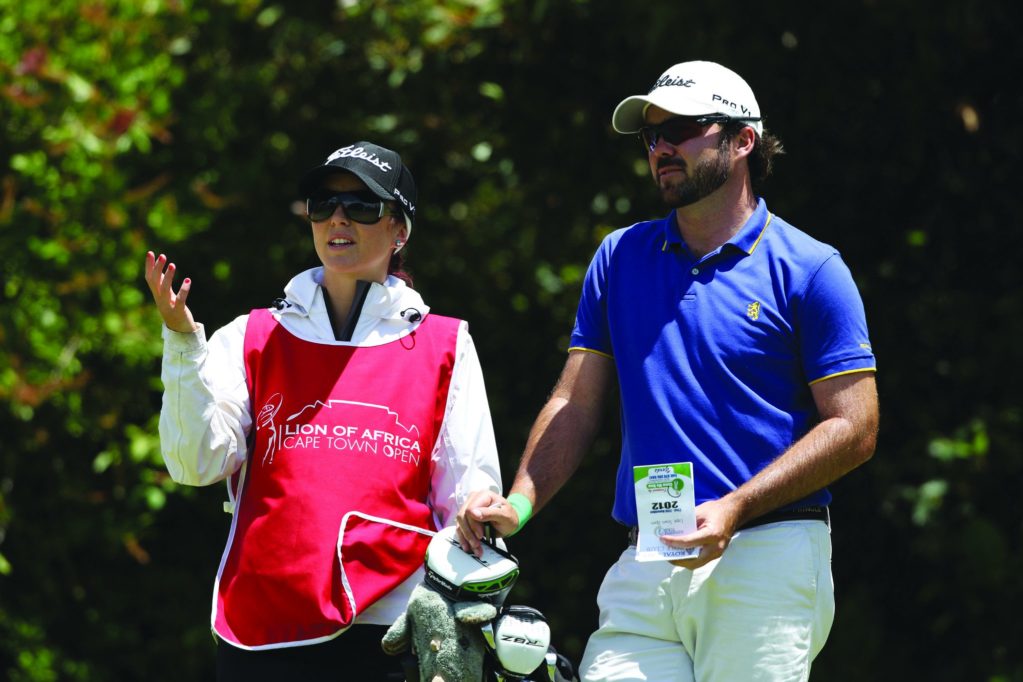Who says being a caddie lacks romance?
Two Zimbabweans, both alike in dignity, in the United States where we lay our scene: one a professional golfer, the other a hairdresser.
Ryan Cairns, a former number-one golfer in Zimbabwe, was in the United States when he came across Tammy Birkett’s profile on Facebook. He liked what he saw and thought he had met her before but when he made contact, it turned out they were complete strangers.
“The only reason I accepted [his friend request] was because we had 120 mutual friends,” says Birkett.
Their conversations became more frequent and, as fate would have it, on an auspicious day they were booked on the same flight from New York to Zimbabwe. They checked in together and after 16 hours there was love in the air. After the two began dating, Cairns popped the question: will you caddie for me?
Loading...
Their first game together was at the Sunshine Big Easy Tour in 2012. Cairns played well, perhaps he was trying to impress Birkett, and landed his first professional win. It was also a first for Birkett as a caddie. She learnt that there was more to it than knowing the yardage, pin placements and which club to use.
“At the time I had run out of money and instead of me paying, she paid for herself. She sponsored her own trip down to South Africa from Harare… [We] ended up winning the tournament and my career turned around. She took a chance on me and that made a huge difference,” says Cairns.
Like any relationship the bond between caddie and player is developed through trials and successes on the green. When Cairns is struggling, Birkett knows just what to do.
“One thing that I always say is, ‘Imagine yourself in a couple of hours when we are watching a movie, chilling, and you’re not even going to have this bad feeling that you have right now, so there is no point in holding onto that.’”
Birkett, who is now in her second year as a caddie, says that her biggest problem—besides being one of the few female caddies—is getting in line with the pedantic.
“When I first started, there were so many rules around the green like walking on your lines… you can’t talk, whisper at certain times and moving the bag was such an issue.”
Across the Beitbridge border, in South Africa, another caddie shares his secret of success.
It was the summer of 1998 at the Nedbank Golf Challenge, also known as the million-dollar golf challenge. As the tournament came to a close Tiger Woods seemed the likely winner. But with a then course record of 24 under par, Nick Price walked away with the trophy. A few steps behind him, carrying his bag, stood Tiger Lekhulene.
“We had beaten Tiger Woods. How many people can say that they beat Tiger Woods?” says Lekhulene.
Beating his namesake was the end of a very long road for Lekhulene. At the age of 14, he began his career as a caddie at Randpark Golf Club in Johannesburg, to pay for his school fees. He matriculated and became a fulltime caddie for top players, including Ian Palmer, Sally Little and Des Terblanche. Of all the players he has carried for, none of them have won as many tournaments as Price. For the past 33 years, Lekhulene has carried for him and is proud to call him a friend.
“I met Nicky by chance. He came to practice at Randpark and asked me to pick up balls for him. After his practice he asked me to caddie for him… he won the first professional game I caddied for him [Asseng TV Challenge Series], in 1979.”
Although caddies advise the player on what club to use and how to play the shot, at the end of the day they know not to overstep.
“You can discuss how to hit a shot but the final decision is up to him, he is the one who is going to hit the ball. You can’t force him to play a shot that he doesn’t want to play,” says Lekhulene.
Although Lekhulene enjoys his career, he says that his biggest issue is in the politics of the game.
“Golfers are not giving professional caddies a fair chance as they used to. I feel white people no longer feel like they should be giving black people so much money. They would rather have their cousins, fathers or family members caddie for them and give them the money. This is placing our careers as professionally-trained caddies at risk,” says Lekhulene.
Both Lekhulene and Birkett agree that there are perks. You get to see the world, make a good living and on top of your pay you often get a very good commission. According to the Sunshine Tour in South Africa, caddies’ salaries differ from caddie to caddie, as it is an agreement between the caddie and the golfer.
Although Lekhulene and Birkett have taken different paths, they both became caddies to top golfers in Africa, proving that there is no set way to become a caddie. Sometimes it takes hard work; sometimes it’s a meeting on the green; and sometimes it’s a romance on a social networking site.
Loading...
